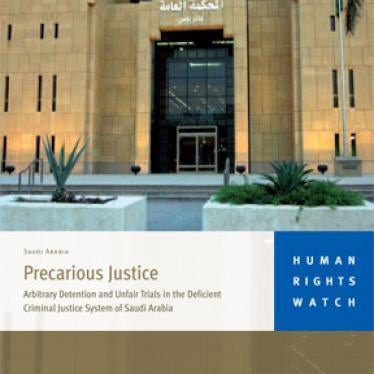(New York, October 3, 2008) – The Saudi government should free unlawfully detained political activists, including Professor Matrook al-Faleh, one of Saudi Arabia’s leading advocates of reform, Human Rights Watch said today. Although Saudi prison officials said that they had amnestied 1,000 convicted criminals during Ramadan in September, dozens of political activists remain behind bars or are subject to arbitrary travel bans.
“Peaceful dissidents continue to be locked up for speaking out, while convicted criminals get amnesty,” said Sarah Leah Whitson, Middle East director at Human Rights Watch. “Apparently the government considers reform advocates a greater danger to their authority.”
Saudi secret police arrested al-Faleh, a professor of political science at King Saud University in Riyadh, on May 19, 2008 at the university. The arrest came two days after he publicly criticized conditions in Buraida prison following a visit to two fellow human rights activists being held there.
For six days, the secret police denied holding him, and even after they acknowledged that he was in detention, officials allowed his family just one visit during the first 60 days.
Saudi officials have not charged al-Faleh with a crime, though the criminal procedure code adopted in 2002 requires the authorities to charge detained suspects and take their statement within 48 hours. Officials have not interrogated him during his five months in prison, and al-Faleh has not been allowed to see the evidence, if any exists, on which the Investigation and Public Prosecutions Bureau is holding him. He is being held in solitary confinement next to suspected militants at the secret police’s al-Ha’ir prison.
Al-Faleh, denied the right to see his lawyers, started a hunger strike. During that time, prison guards taunted him with food and also shined a bright light in his cell around the clock. He has since broken off his hunger strike. His lawyers, Ibrahim Mubaraki and Khalid al-Mutairi, still have not been allowed to visit him.
Officials said they released at least 1,000 prisoners during the holy month of Ramadan, Saudi newspapers Al-Riyadh, Okaz, and Al-Sharq al-Awsat reported between September 14 and 29. In November 2007, 1,500 suspected militants held in separate prisons run by the secret police were released after undergoing a reeducation program in prison. These detainees had never faced charge or trial.
In February 2007, Saudi secret police arrested nine dissidents in Jeddah, who remain in prison without charge or trial. In December 2007, the secret police detained for almost five months without charge or trial Fu’ad Farhan, a blogger who had written in support of the release of the Jeddah group. Mansur al-‘Awdha, a reform activist from Jawf, has been in al-Ha’ir prison without charge since December 2007.
The Universal Declaration of Human Rights spells out the rights to free expression and freedom from arbitrary arrest. Closely mirroring the International Convention on Civil and Political Rights (ICCPR), articles 14 and 32 of the Arab Charter of Human Rights, which the Saudi Shura Council (an appointed parliament) ratified in March 2008, guarantee freedom from arbitrary arrest and freedom of expression. Saudi Arabia has not signed the ICCPR.
The kingdom has no penal code, and there are only a few statutory offenses, such as drug smuggling and embezzlement. Saudi Arabia implemented a Criminal Procedure Code safeguarding due process rights in 2002; articles 34 and 116 oblige the authorities to charge detained suspects within 48 hours.







